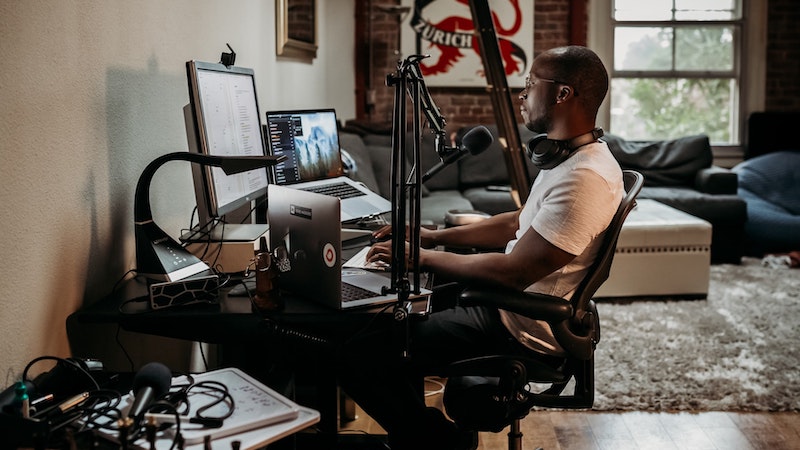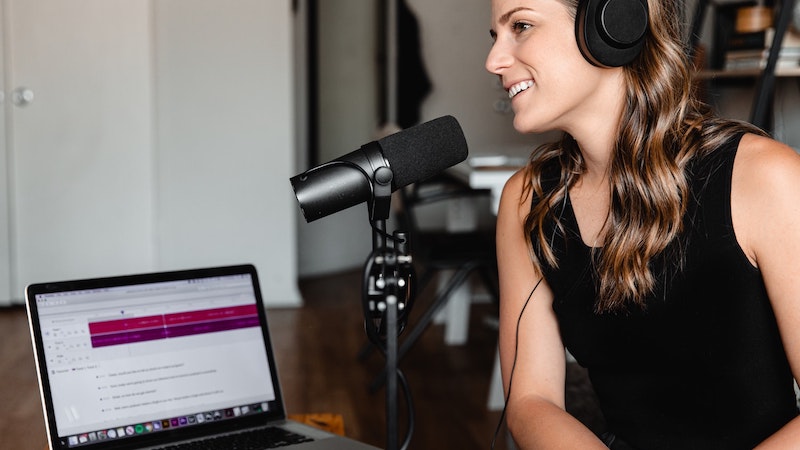The video editor for podcasters Get unlimited 15-second videos for free
This is why music in your podcast is more important than you think
Music in a podcast? At first, this might sound like a contradiction, or maybe a bad combination. But there are actually some very good reasons for including music in your podcast. In this article, we'll explain why having music in your podcast can be more important than you might think.
Music creates emotions
Everyone has associations for different songs. Music brings up memories of times, places, and other people in our lives. And with these memories come certain emotions. This is one of the goals of including music in your podcast.
If you stick to a certain style or a specific song, you can help listeners have an emotional connection with your podcast. They will begin to associate you and your podcast with the song and a certain emotion.
This is due to emotions creating recognition value; through music, you create emotions and strengthen your brand at the same time.
How do I choose the music for my podcast?
First of all, of course, you should like the music. Having music you enjoy will help set your mood for the podcast, and it's exactly this mood that you will then reflect in your content.
As already mentioned, emotions are an important part of your podcast. So, you must ask yourself what emotions you want your listeners to feel and experience when they listen to your podcast.
For example, if your listeners listen to your podcast to relax after a hard and stressful day, this mood should also be reflected in the music. Music with low BPM (beats per minute) can then be appropriate. Depending on the content of your podcast, it might even be good to use music that has the tempo of a typical resting pulse rate.
On the other hand, if you want to motivate your listeners with your podcast, it makes sense to use music that is more up-tempo.
If your podcast is about factual or scientific topics, simple music that doesn't distract from the content works best.
Podcast intros: What you should pay attention to
We have all experienced this from our favorite series: the intro lets us know the show is about to start, and we usually know the intro by heart after just a few episodes.
This is precisely the goal with a podcast intro. Make sure, however, that the intro is short and to the point; there is hardly anything worse for listeners than having to sit through a never-ending intro. So, within a maximum of 20 seconds of intro music, your actual podcast should start.
What are the benefits of music in podcast intros?
- The music gives you a clear break between the episode teaser and the main part of the episode. With a music intro, you build a certain tension.
- Through music, you stimulate the emotions you want your listeners to feel.
- Music helps create listener recognition of your podcast. Your listeners will associate the intro with you and your podcast. This can also give you a great advantage for other projects, for example if you want to produce videos or sell your own products on a website. If you include your podcast intro in these other projects, your listeners will recognize you.
These are the legal aspects you should be aware of
Before you choose music for your podcast, you should check whether you have sufficient usage rights. In order not to receive warnings or even lawsuits, you should protect yourself sufficiently. Optimally, you should get written permission from the copyright holder to use the music for your podcast.
GEMA plays an important role in copyright law. It is a collecting society and plays an intermediary role.
Various composers, music publishers and lyricists transfer their copyrights to GEMA. GEMA in turn makes these available to music users for a fee. This ensures that the musicians' intellectual property is protected and that they are adequately compensated for their works at the same time.
At GEMA, you can also buy licenses for podcast music. You can purchase licenses with terms of one month, three months, or twelve months. The prerequisite for using the license store is that your podcast does not exceed 50,000 views per month.
Overall, there are four different types of music that you can use in your podcast
- Free music: Songs and music that are provided free of charge are often made available under Creative Commons licenses. This is especially handy for smaller podcasts that only have a small budget. With this music, it is usually sufficient just to mention the name of the artist.
- GEMA-free music: There are songs that are offered as GEMA-free music. A few of them are free, but usually you have to pay a license fee for use. There are also providers whose music is both royalty-free and Creative Commons music.
- Music from the catalog of GEMA: Of course, you can also take advantage of what GEMA offers. You can purchase individual licenses from GEMA at a special rate for podcasts.
- Have music created: If you need completely original and unique music for your podcast, you can also hire a composer. This option is of course the most expensive, but the music will then be completely customized according to your wishes.
Use music for social media
Music also plays a crucial role in promoting your podcast. For example, you can use music to create audiograms. Audiograms are short videos that combine an audio clip from your podcast with the sound waveform and an image.
Audiograms are a great way to promote your podcast on social media because they are real eye-catchers. They stand out much more than image files or audio clips, so people are more likely to check out a podcast if they see an audiogram of it.
Creating audiograms is really easy, especially if you already know exactly what music you want to use along with your audio clips. Programs like Audiocado are free and allow you to create cool audiograms in just a few minutes.
Try Audiocado now for completely free and take advantage of all the new features, such as inserting subtitles.


